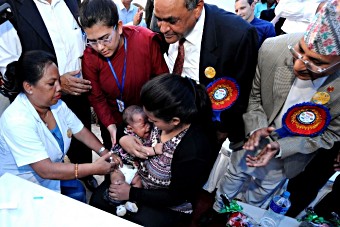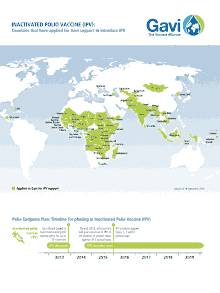
Credit: UNICEF Nepal/2014
Geneva, 18 September 2014 – Nepal today becomes the first country in the world to use support from Gavi, the Vaccine Alliance to begin protecting its children with Inactivated Polio Vaccine (IPV). The introduction is part of a plan to ensure that IPV will be to available millions of children in Gavi-supported countries through the introduction of the vaccine into routine immunisation systems.
Children in Afghanistan and Pakistan – two of the final three countries where polio remains endemic – are also set to begin receiving inactivated polio vaccine (IPV) by the end of next year as part of the planned ‘endgame’ for eradicating the crippling disease. Nigeria, the third country where polio remains endemic, has also applied to introduce IPV, with approval expected shortly.
Afghanistan, Nepal and Pakistan are among 25 countries who have received approval to begin using IPV with support from Gavi, while gradually phasing out the oral polio vaccine (OPV) which is currently used in most developing countries.
While the oral polio vaccine has successfully reduced polio cases by 99% worldwide, adding IPV to routine immunisation programmes will improve immunity and help prevent new vaccine-associated outbreaks from emerging. In May 2013, the World Health Assembly endorsed the Polio Eradication & Endgame Strategic Plan 2013-2018, calling on countries to strengthen routine immunisation programmes and introduce at least one dose of IPV as a lead up to the phased removal of oral polio vaccines.
“Nepal’s introduction of IPV with Gavi support marks an important moment in the global effort to secure a polio-free future,” said Dr Seth Berkley, CEO of Gavi, the Vaccine Alliance. “Gavi is working with partners to ensure that millions of children in the world’s poorest countries are protected with IPV through routine immunisation as an important step towards achieving global polio eradication.”
Less than a year after the Alliance Board agreed to fund IPV introductions, almost 90% of Gavi-supported countries have submitted applications. Gavi-eligible and graduating countries are able to apply for support until mid-2015 with introductions targeted before the end of next year. Countries approved for IPV introductions can also receive a one-time grant to support a share of the additional costs related to the vaccine’s introduction.
Last year more than 400 cases of wild polio virus were recorded, mostly in endemic countries and since the beginning of this year more than 150 cases have been reported, mainly in Pakistan but also in non-endemic countries such as Equatorial Guinea, Iraq, Cameroon, Syria and Ethiopia.
The World Health Organization Director-General, Dr Margaret Chan, recently issued a Temporary Recommendations under the International Health Regulations (2005) to prevent further spread of the disease as the high transmission season approaches.
Note to editors
The first 25 countries approved for support are: Afghanistan, Bangladesh, Benin, Bhutan, Cameroon, Comoros, DR Congo, Ethiopia, Gambia, Guinea, Kiribati, Korea DPR, Lao PDR, Liberia, Madagascar, Malawi, Nepal, Pakistan, Senegal, Sri Lanka, Sudan, Tajikistan, Tanzania, Uganda, Yemen

